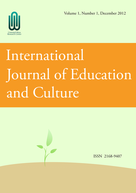


Volume 13 Issues 3-4 (2024-12-31)
Volume 13 Issues 1-2 (2024-06-30)
Volume 12 Issues 3-4 (2023-12-31)
Volume 12 Issues 1-2 (2023-06-30)
Volume 10 Issues 1&2 (2021-06-30)
Volume 9 Issues 3&4 (2020-12-31)
Volume 9 Issues 1&2 (2020-06-30)
Volume 8 Issues 3&4 (2019-12-31)
Volume 8 Issues 1&2 (2019-06-30)
Volume 7 Issues 3&4 (2018-12-31)
Volume 7 Issues 1&2 (2018-06-30)
Volume 6 Issues 3&4 (2017-12-31)
Volume 6 Issues 1&2 (2017-06-30)
Volume 5 Issues 3&4 (2016-12-31)
Volume 5 Issues 1&2 (2016-06-30)
Volume 4 Issues 3&4 (2015-12-31)
Education consists of a way of thinking and doing—in theory and practice. In Africa, in the sub-Saharan area, the construction of an indigenous educational practice is at the center of the academic and cultural debate. The debate seeks to structure an educational system that is based on a new paradigm; that considered the heritage of the previous education systems, mainly based on western education. The idea is that the use of tools and paradigms extraneous to tradition (i.e., western education) does not compromise the African identity because these tools are “Africanized” and become something else. This article analyzes this process of “Africanization.” It tries to understand how the new educational practice can offer opportunities and make education on the continent more accessible. It explores the suggestions that this debate can give to the education in other areas of the world and to education as a whole.
This study investigated the relationships among college students’ goal orientations, meta-cognitive strategies and academic performances. The participants were 764 freshmen and senior students from three universities in China. The instruments included surveys measuring participants’ goal orientations, meta-cognitive strategies, and academic performances. Correlation, regression, and structural equation modeling (SEM) analyses were performed to examine a) the relationships among goal orientations, meta- cognitive strategies, and academic performances; b) the mediating and moderating effects of meta-cognitive strategies between the academic performances and goal orientations; and c) the structural relationships among goal orientations, meta-cognitive strategies, and academic performances. The results suggested that students’ goal orientations not only directly influenced their academic performances, but also indirectly affected their academic performances through meta-cognitive strategies. The meta-cognitive strategies produced the mediating effect on goal orientations and academic performances. Educational implications are discussed.
Every organization has specific features in carrying out day to day activities. The understanding of how an organization works is fundamental to how it has been managed, to have a role in it that could be effective. We describe the main historical theoretical contributions. Although modifications and variations have been proposed over the years, they remain points of reference for any analysis on the functioning of organizations. This is the first step to begin to run an organization. A manager can’t act in the right way without a deep knowledge about how things could be properly arranged. Different scholars have x-rayed the organizational administrative settings and how its functions affect difference spheres of the organizational environment. We will propose, which in our opinion is the best approach to educational organizations, like schools.